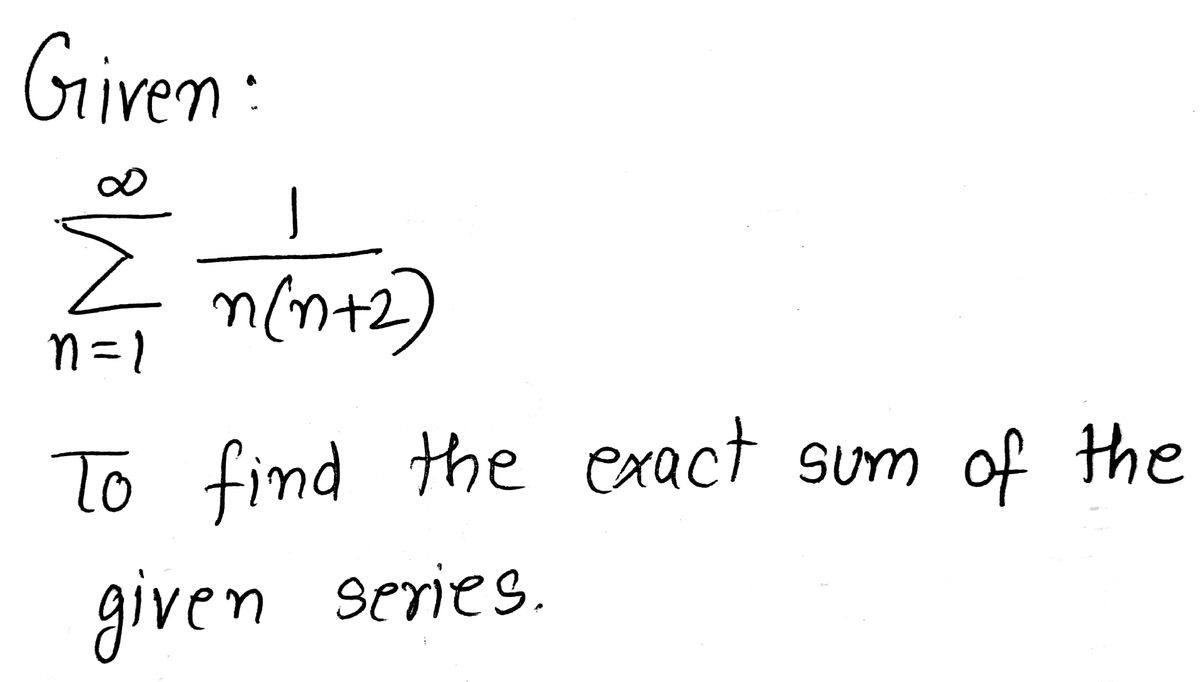Calculus: Early Transcendentals
8th Edition
ISBN:9781285741550
Author:James Stewart
Publisher:James Stewart
Chapter1: Functions And Models
Section: Chapter Questions
Problem 1RCC: (a) What is a function? What are its domain and range? (b) What is the graph of a function? (c) How...
Related questions
Topic Video
Question
![**Question 6: Finding the Exact Sum of the Series**
Consider the series given by the equation below:
\[ \sum_{n=1}^{\infty} \frac{1}{n(n+2)} \]
The task is to find the exact sum of this infinite series.
In the expression above:
- \(\sum_{n=1}^{\infty}\) denotes the summation from \(n=1\) to infinity.
- The term \(\frac{1}{n(n+2)}\) is the general term of the series.
To solve this problem, one typically needs to use partial fraction decomposition or other series summation techniques.
For educational purposes, we will guide you through the steps needed to find the exact sum of this series. Let's explore the solution together!
**Step-by-step Solution:**
1. **Partial Fraction Decomposition**:
- Begin by decomposing the term \(\frac{1}{n(n+2)}\) into simpler fractions.
- This can be expressed as:
\[
\frac{1}{n(n+2)} = \frac{A}{n} + \frac{B}{n+2}
\]
- Solve for constants \(A\) and \(B\).
2. **Finding Constants**:
- Multiply both sides by \(n(n+2)\) to obtain a common denominator:
\[
1 = A(n+2) + Bn
\]
- Set up a system of equations to solve for \(A\) and \(B\):
\[
1 = An + 2A + Bn
\]
\[
1 = (A + B)n + 2A
\]
- Equate coefficients of \(n\) and the constant term:
\[
A + B = 0
\]
\[
2A = 1 \implies A = \frac{1}{2} \implies B = -\frac{1}{2}
\]
3. **Substituting Back**:
- Substitute \(A\) and \(B\) back into the partial fractions:
\[
\frac{1}{n(n+2)} = \frac{\frac{1}{2}}{n} + \frac{-\frac{1}{2}}{n+](/v2/_next/image?url=https%3A%2F%2Fcontent.bartleby.com%2Fqna-images%2Fquestion%2F3bf7da54-5138-4b57-a0f9-aec30fa8e8cf%2F50f5ebc3-8408-4a8f-9710-7527a04a5a3a%2Fxrpc8r_reoriented.jpeg&w=3840&q=75)
Transcribed Image Text:**Question 6: Finding the Exact Sum of the Series**
Consider the series given by the equation below:
\[ \sum_{n=1}^{\infty} \frac{1}{n(n+2)} \]
The task is to find the exact sum of this infinite series.
In the expression above:
- \(\sum_{n=1}^{\infty}\) denotes the summation from \(n=1\) to infinity.
- The term \(\frac{1}{n(n+2)}\) is the general term of the series.
To solve this problem, one typically needs to use partial fraction decomposition or other series summation techniques.
For educational purposes, we will guide you through the steps needed to find the exact sum of this series. Let's explore the solution together!
**Step-by-step Solution:**
1. **Partial Fraction Decomposition**:
- Begin by decomposing the term \(\frac{1}{n(n+2)}\) into simpler fractions.
- This can be expressed as:
\[
\frac{1}{n(n+2)} = \frac{A}{n} + \frac{B}{n+2}
\]
- Solve for constants \(A\) and \(B\).
2. **Finding Constants**:
- Multiply both sides by \(n(n+2)\) to obtain a common denominator:
\[
1 = A(n+2) + Bn
\]
- Set up a system of equations to solve for \(A\) and \(B\):
\[
1 = An + 2A + Bn
\]
\[
1 = (A + B)n + 2A
\]
- Equate coefficients of \(n\) and the constant term:
\[
A + B = 0
\]
\[
2A = 1 \implies A = \frac{1}{2} \implies B = -\frac{1}{2}
\]
3. **Substituting Back**:
- Substitute \(A\) and \(B\) back into the partial fractions:
\[
\frac{1}{n(n+2)} = \frac{\frac{1}{2}}{n} + \frac{-\frac{1}{2}}{n+
Expert Solution
Step 1 : Analysis

Step 2 : Simplification

Step by step
Solved in 3 steps with 3 images

Knowledge Booster
Learn more about
Need a deep-dive on the concept behind this application? Look no further. Learn more about this topic, calculus and related others by exploring similar questions and additional content below.Recommended textbooks for you

Calculus: Early Transcendentals
Calculus
ISBN:
9781285741550
Author:
James Stewart
Publisher:
Cengage Learning

Thomas' Calculus (14th Edition)
Calculus
ISBN:
9780134438986
Author:
Joel R. Hass, Christopher E. Heil, Maurice D. Weir
Publisher:
PEARSON

Calculus: Early Transcendentals (3rd Edition)
Calculus
ISBN:
9780134763644
Author:
William L. Briggs, Lyle Cochran, Bernard Gillett, Eric Schulz
Publisher:
PEARSON

Calculus: Early Transcendentals
Calculus
ISBN:
9781285741550
Author:
James Stewart
Publisher:
Cengage Learning

Thomas' Calculus (14th Edition)
Calculus
ISBN:
9780134438986
Author:
Joel R. Hass, Christopher E. Heil, Maurice D. Weir
Publisher:
PEARSON

Calculus: Early Transcendentals (3rd Edition)
Calculus
ISBN:
9780134763644
Author:
William L. Briggs, Lyle Cochran, Bernard Gillett, Eric Schulz
Publisher:
PEARSON

Calculus: Early Transcendentals
Calculus
ISBN:
9781319050740
Author:
Jon Rogawski, Colin Adams, Robert Franzosa
Publisher:
W. H. Freeman


Calculus: Early Transcendental Functions
Calculus
ISBN:
9781337552516
Author:
Ron Larson, Bruce H. Edwards
Publisher:
Cengage Learning